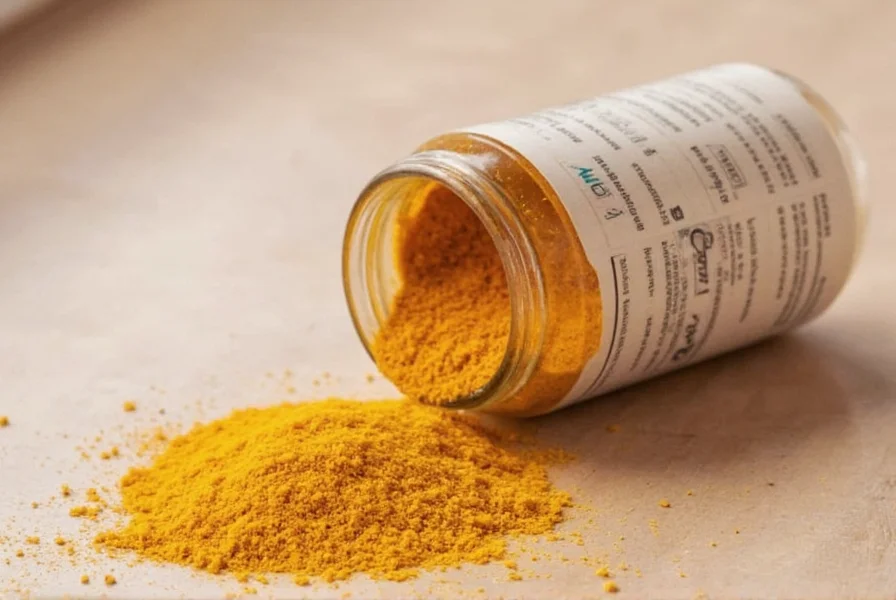As a pet owner exploring natural supplements for your canine companion, you've likely wondered about turmeric's potential benefits. This golden spice has gained popularity in veterinary circles for its anti-inflammatory properties, but understanding proper usage is critical for your dog's safety and wellbeing.
The Science Behind Turmeric for Dogs
Turmeric (Curcuma longa) contains curcumin, the active compound responsible for most of its therapeutic effects. Research shows curcumin has potent anti-inflammatory and antioxidant properties that may benefit dogs suffering from conditions like osteoarthritis. A 2016 study published in Veterinary Medicine and Science demonstrated that dogs with osteoarthritis showed improved mobility after receiving curcumin supplements.
However, curcumin has low bioavailability on its own. When considering how to give turmeric to dogs, most veterinarians recommend combining it with black pepper (which contains piperine) and healthy fats to enhance absorption. This combination can increase curcumin absorption by up to 2,000%.
Documented Benefits of Turmeric for Dogs
When used appropriately, turmeric may provide several health benefits for dogs:
| Benefit | Scientific Support | Recommended For |
|---|---|---|
| Joint health improvement | Moderate clinical evidence | Arthritic dogs, senior dogs |
| Reduced inflammation | Strong laboratory evidence | Dogs with inflammatory conditions |
| Antioxidant protection | Well-documented | General wellness, aging dogs |
| Digestive support | Limited evidence | Dogs with mild digestive issues |
Potential Risks and Side Effects
While turmeric is generally safe for dogs, improper use can lead to adverse effects. Understanding the side effects of turmeric in dogs is crucial for responsible supplementation:
- Digestive upset: High doses may cause vomiting, diarrhea, or stomach irritation
- Blood thinning: Turmeric has natural anticoagulant properties that could interact with medications
- Gallbladder issues: May worsen conditions like bile duct obstruction
- Drug interactions: Can interfere with certain chemotherapy drugs and diabetes medications
Dogs with pre-existing conditions such as kidney stones, gallbladder disease, or bleeding disorders should avoid turmeric unless specifically approved by a veterinarian. Pregnant dogs should also avoid turmeric supplements due to limited safety data.
Proper Turmeric Dosage for Dogs
Getting the turmeric dosage for dogs correct is essential for both effectiveness and safety. Veterinarians typically recommend:
- General guideline: 15-20 mg per pound of body weight
- Maximum daily dose: Do not exceed 1/8 to 1/4 teaspoon per 10 pounds of body weight
- Frequency: Once or twice daily with food
For example, a 50-pound dog would receive approximately 1/2 to 1 teaspoon of turmeric daily, divided into two doses. Always start with a lower dose and gradually increase while monitoring for any adverse reactions.

How to Administer Turmeric to Dogs
Simply sprinkling turmeric powder on your dog's food won't provide optimal benefits due to poor absorption. For best results when considering how to give turmeric to dogs, create a 'golden paste' by:
- Mixing 1/2 cup turmeric powder with 1 cup water
- Adding 1/3 cup healthy fat (coconut oil or olive oil)
- Incorporating 1.5 teaspoons black pepper
- Simmering on low heat for 7-10 minutes until thickened
- Storing in refrigerator for up to two weeks
This preparation significantly improves curcumin absorption. Add the appropriate dose to your dog's food, mixing thoroughly. Many dogs enjoy the flavor, but if your pet is picky, you can hide the paste in a small amount of peanut butter or yogurt.
When to Consult Your Veterinarian
Before introducing turmeric or any supplement to your dog's diet, schedule a consultation with your veterinarian. This is especially important if your dog:
- Is currently taking medications (particularly blood thinners)
- Has pre-existing health conditions
- Is scheduled for surgery within the next two weeks
- Shows signs of digestive upset after initial turmeric administration
Your veterinarian can help determine if turmeric is appropriate for your dog's specific health needs and recommend the proper dosage based on your pet's weight, age, and medical history. They may also suggest alternative treatments if turmeric isn't suitable for your dog.
Quality Considerations for Turmeric Supplements
Not all turmeric products are created equal. When selecting a product for your dog, look for:
- Certified organic turmeric to avoid pesticides and contaminants
- Products specifically formulated for pets with appropriate dosing
- Third-party testing for purity and potency
- Formulations that include black pepper extract (piperine) for better absorption
- Products free from unnecessary fillers or additives
Human-grade turmeric supplements often contain higher concentrations than appropriate for dogs, so pet-specific formulations are generally preferable. If using human-grade products, consult your veterinarian for proper dilution.

Conclusion: Making an Informed Decision
Turmeric can be a beneficial supplement for dogs when used appropriately under veterinary guidance. The potential benefits of turmeric for dogs include reduced inflammation, improved joint mobility, and antioxidant support. However, proper dosage and awareness of potential interactions are essential for safety.
Remember that turmeric is a supplement, not a replacement for conventional veterinary care. For dogs with significant health issues like severe arthritis, turmeric should complement—not replace—prescribed treatments. Always monitor your dog for any adverse reactions when introducing new supplements, and discontinue use if any negative symptoms appear.
Can turmeric help with my dog's arthritis?
Yes, turmeric's anti-inflammatory properties may help reduce joint pain and improve mobility in dogs with arthritis. Multiple studies have shown promising results, but it works best as part of a comprehensive treatment plan that may include weight management, exercise modification, and conventional medications. Always consult your veterinarian before using turmeric for dog arthritis, as it may not be sufficient as a standalone treatment for moderate to severe cases.
How long does it take to see results from turmeric in dogs?
Most pet owners report noticing improvements in their dog's mobility and comfort within 2-4 weeks of consistent, proper dosing. However, the full benefits may take 6-8 weeks to become apparent as curcumin builds up in the system. Some dogs show subtle improvements within the first week, while others may require the full 8-week period to demonstrate noticeable changes. Patience and consistent administration are key when using turmeric for dogs.
Can dogs have turmeric and black pepper together?
Yes, dogs can safely have turmeric combined with black pepper, and this combination is actually recommended. Black pepper contains piperine, which significantly enhances the absorption of curcumin (the active compound in turmeric) by up to 2,000%. The typical ratio is about 1/4 teaspoon of black pepper for every 1/2 cup of turmeric when making golden paste. However, avoid giving large amounts of black pepper alone, as it can cause digestive upset in some dogs.
What are the signs that my dog shouldn't take turmeric?
Dogs with certain health conditions should avoid turmeric or use it only under veterinary supervision. These include dogs with gallbladder disease, bile duct obstruction, bleeding disorders, or those taking blood-thinning medications. Additionally, if your dog develops vomiting, diarrhea, or loss of appetite after starting turmeric, discontinue use immediately. Dogs scheduled for surgery within the next two weeks should stop turmeric due to its blood-thinning effects. Always consult your veterinarian if you're unsure whether turmeric is appropriate for your dog's specific health situation.










 浙公网安备
33010002000092号
浙公网安备
33010002000092号 浙B2-20120091-4
浙B2-20120091-4